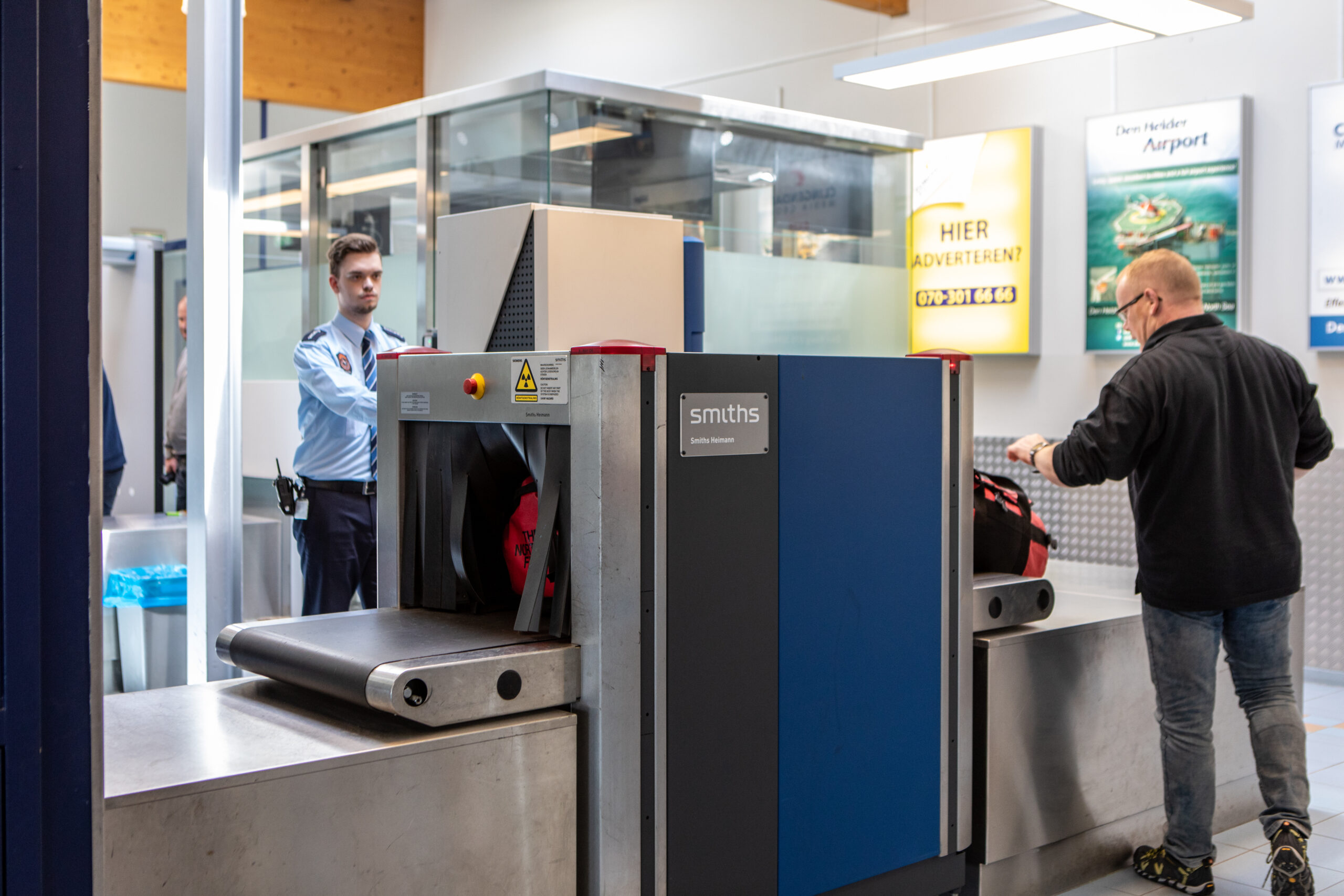Den Helder Airport has been facilitating the Netherlands in the offshore energy supply since the late 1960s. With Den Helder Airport, the Netherlands has a unique offer for the Dutch offshore energy tasking. Den Helder Airport is the only airport in the Netherlands that is fully equipped to properly guarantee the security of energy supply by fully checking passengers, luggage and cargo through our security systems. However, the systems that ensure this are not laid down in law, which has created an uneven playing field with the other small regional “offshore” airports. In addition to the considerable challenges of sustainability, infrastructure development and innovations with drones, the security infrastructure is the backbone of Den Helder Airport and is therefore also important for part of the maintenance of the Dutch part of the climate challenges.
Below we discuss how this problem is facilitated, the possible solutions, and why this is essential for the future of the Dutch offshore energy supply.
State of affairs in current legislation
The 24,000 annual offshore flight movements from Den Helder Airport have no status within Dutch aviation legislation. Even the 2020-2050 Aviation Memorandum adopted in 2022, which contains important rules and conditions for the future development of civil aviation, has failed to include the offshore aviation sector. In short, no policy has been formulated that monitors access to primary energy areas by air.
In 2021, Den Helder Airport discussed this case with the Ministry of Infrastructure and Water Management, requesting that targeted offshore aviation policy be included in the implementation agenda of the aviation memorandum. Although the ministry was sympathetic to Den Helder Airport's plea and also admitted that offshore aviation is a blind spot at IenW, we were also made aware of the fact of market forces. However, this could only be achieved if Den Helder Airport scaled down all security systems and reduced the level of facilities to the level of the other small regional airports. In this scenario, the Netherlands could lose the ability to fly offshore to Germany or the United Kingdom in the event of a substantial threat. After all, infrastructure that has been scaled down will not return soon. In short, the lack of regulation has created an uneven playing field, which is entirely independent of Den Helder Airport's ability as an entrepreneur.
Solutions
- The revised implementation agenda of the Aviation Policy Document must include that the Ministry of Infrastructure and Water Management will monitor the implementation of legislation and regulations that guarantee security requirements for offshore aviation policy.
- A last lifeline to maintain the infrastructure at Den Helder Airport could possibly be EU directive COM-829 (the implementation of which to be expected mid 2024). This guideline describes policies regarding the resilience of critical entities. The member states of 10 sectors are asked to compile an overview of critical infrastructure and providers before the end of 2023. Den Helder Airport can be linked to 2 sectors from this guideline, namely; Energy and Aviation. With the outbreak of the corona pandemic, this becomes clear for the first time when Den Helder Airport is classified as a critical infrastructure for the supply of oil and gas and procedures and measures are taken to ensure that offshore flights can continue unabated. Den Helder was then the only location in the Netherlands from which offshore flights were flown.Why is this indispensable for the future of offshore energy supply?
- Level playing field
Today, Den Helder Airport often has the same security systems as many international airports, supplemented with regular drug and alcohol checks and the presence of Marechaussees and customs. This makes Den Helder Airport unique in its kind. Other small airports in the Netherlands from which offshore flights are flown do not meet these self-imposed security requirements, which seriously jeopardizes general safety in both the airspace and on the offshore platforms. Because the total business case will also become smaller as a result of the energy transition, economic pressure will arise on the security systems that have become replaceable by direct competition due to a lack of regulation. Regulation creates one level playing field in which there is no longer competition for security measures.
By way of illustration, the International Ships and Port Facility Security (ISPS) code was enshrined in the Port Security Act in the Netherlands in 2004, as a result of which ports received the same security as airports. Paradoxically, seaports today therefore offer better security against unauthorized access to the primary energy systems at sea than Dutch regional civil airports.
- Sustainability
The margins of the offshore wind sector have been under pressure for some time and the sector therefore wants to supply the wind farms from small cheap helipads. Think of helicopter fields in Eemshaven, IJmuiden, Amsterdam-West, Oostwold, Pistolhaven Rotterdam and Central Zeeland. The sector also believes that Den Helder Airport is too far away from the northern wind farms.
Only a few of these new alternative offshore airports have maintenance space for helicopters, which means that in daily practice empty helicopters, for example from Rotterdam, fly to Eemshaven to fly passengers offshore from there and vice versa. These passengers were usually first transported by bus to Eemshaven via Schiphol. If all these "empty legs" are added together, the fact that Den Helder Airport would be too far away is no longer correct.
Apart from the fact that this daily practice is far from sustainable, it has created an open unsecured corridor to our primary energy installations at sea. It should not be forgotten that these competing airports have marginal facilities, similar to other small green airports, without any form of control or security of cargo and passengers.
Now that the wind farms are also being built further away from the coast, Den Helder Airport remains the most geographically sustainable location for all wind farms.
- Delivery security
Since 2016, the enormous increase in offshore wind farms in the North Sea has also signaled a growing security problem. In 2021, the The Hague Center for Strategic Studies (HCSS) will report in High Value of the North Sea, among other things, that large parts of the offshore energy systems are poorly secured, the responsibilities between ministries are fragmented and there is a lack of targeted policy, supervision and direction. The war in Ukraine is also the provisional conclusion of the perfect storm for Den Helder Airport. With the justified desire to become independent of Russian gas, the ambitions to transform the North Sea into a power plant are reaching boiling point. The Netherlands wants to install more than 70 GW of offshore wind energy by 2050 (in 2021 there was 2.4 GW in the Dutch part of the North Sea!). To achieve this, the targets for 2030 have been doubled, from 11 GW to more than 21 GW. There is no shortage of ambitions in this area.
However, this gigantic task also speeds up the reproduction of the mentioned flaws. It is essential that offshore flight movements form a structured part of this growth policy in order to prevent serious safety problems.
Closing
In summary, Den Helder Airport advocates the implementation of legislation and regulations for the offshore aviation sector to protect the security of supply of the growing supply of offshore energy facilities in the North Sea.
| Appendix I: About Den Helder Airport
Origin history Dutch offshore aviation dates back to the late 1960s, when the first helicopter flights for the American oil company Placid shuttled between Den Helder and the drilling rigs in the Southern North Sea from a specially constructed heliport of the municipality of Den Helder under a Nuisance Act permit. In 1981, the sharp increase in exploration and extraction of oil and gas in the North Sea resulted in more and more passengers flying offshore via Den Helder. Subsequently, a permit for shared use by the operator of military airport De Kooy (Airport Decree De Kooy) was agreed for Den Helder Airport CV. At this military airport, civilian co-user Den Helder Airport has grown into the third largest helicopter operation in Europe. During this period, the oil and gas companies registered in the Netherlands organized themselves in the sector association NOGEPA, which, among other things, promoted safety and security of supply of offshore energy. The association also imposed a large number of measures on Den Helder Airport, with which the transport of passengers and cargo was heavily secured with both procedures and additional facilities. Marchaussee and Customs were also already active at the airport at that time. Due to all these measures, Den Helder Airport today often has the same security systems as at many international airports, supplemented with regular drug and alcohol checks. This made Den Helder Airport unique in its kind. In recent years, flight weighing and passengers have remained active:
Den Helder Airport within aviation legislation Within Dutch aviation legislation, airports are divided into: Schiphol airport, other civil airports and military airports. Other civil airports can be of regional significance or of national significance. Airports are of national significance if they are located outside provincial boundaries as determined by virtue of the Provinces Act or by law. Airports of national importance are Lelystad, Eelde, Maastricht and Rotterdam. The aviation sector is divided into a civil sector, civil aviation, and a non-civil sector. The latter sector includes air traffic that is active for military, police and customs tasks. The civil aviation sector consists of:
From the perspective of aviation legislation, Den Helder Airport is a small regional airport with a permit for civilian joint use from the Ministry of Defense. Control mechanisms for Den Helder Airport are the airport decision and the safety manual.
|
29-03-2023

